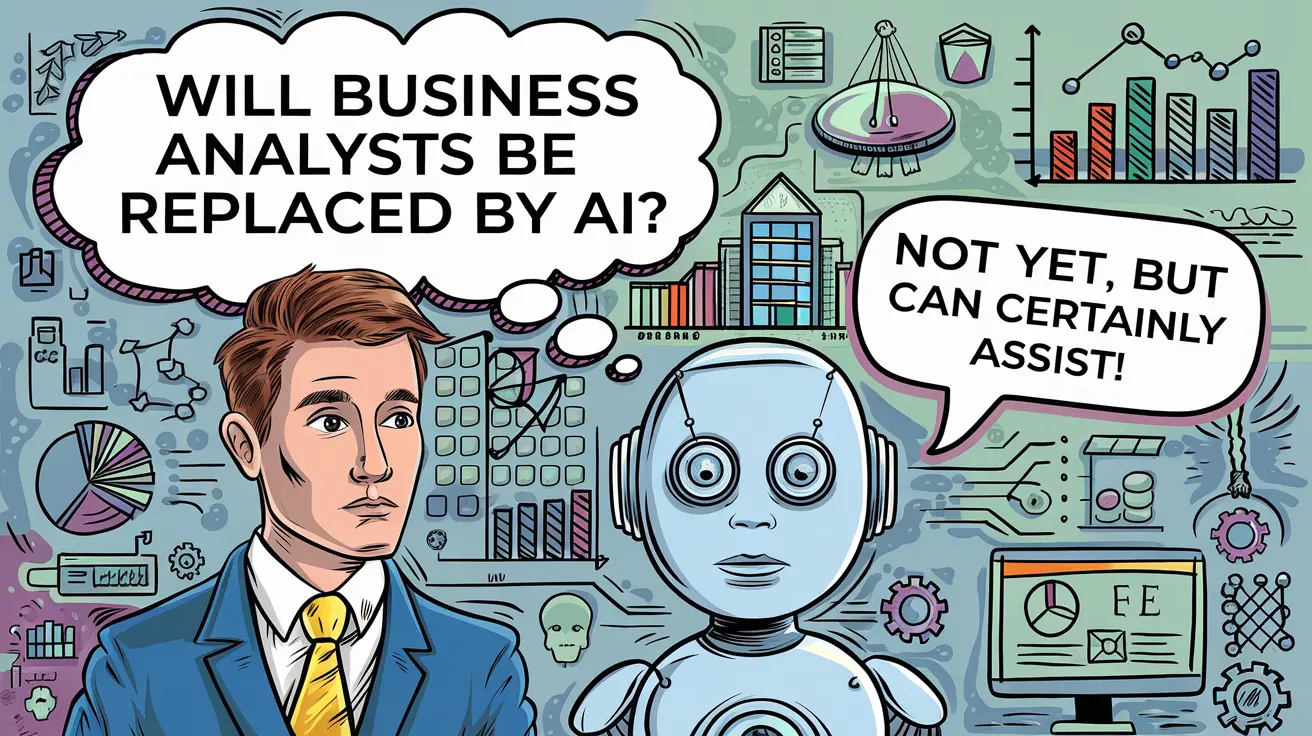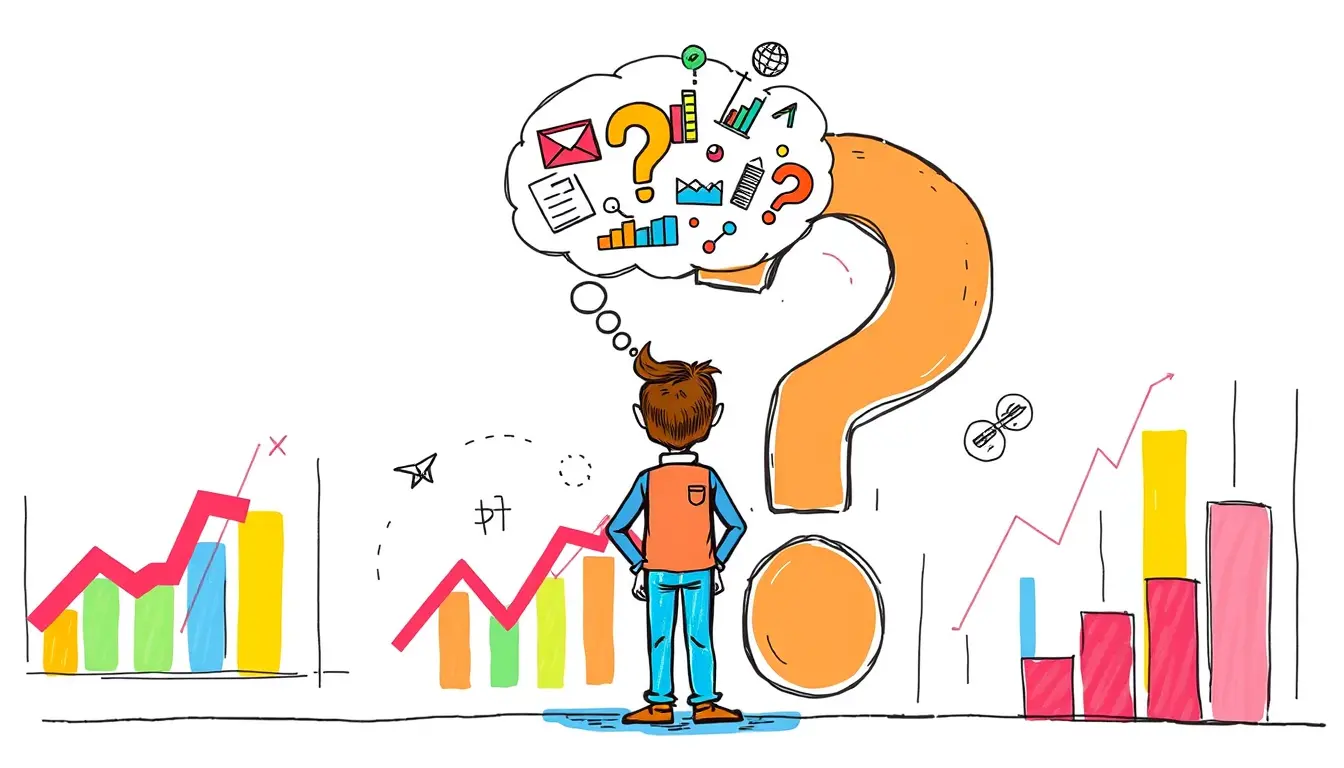The Rise of AI in Business Analytics
Artificial intelligence has revolutionized countless industries. From healthcare to finance, AI’s impact is undeniable. But what about business analysis? Will AI replace human analysts?
The role of a business analyst is crucial. They bridge the gap between IT and business. They interpret data, identify trends, and guide decision-making. As AI advances, some fear it might make this role obsolete.
However, the reality is more nuanced. AI isn’t just a threat; it’s also an opportunity. It’s changing the landscape of business analysis. But it’s not necessarily replacing analysts. Instead, it’s augmenting their capabilities.
AI excels at processing vast amounts of data quickly. It can identify patterns humans might miss. This speed and accuracy are invaluable in today’s fast-paced business world. But AI lacks human intuition and contextual understanding.
Business analysts bring unique skills to the table. They understand company culture, industry nuances, and stakeholder needs. These human elements are crucial for effective decision-making. AI can provide insights, but interpreting them requires human expertise.
The future likely involves a symbiotic relationship between AI and analysts. AI will handle data processing and initial analysis. Analysts will focus on interpretation, strategy, and communication. This collaboration will lead to more informed, efficient decision-making.
The Evolution of Business Analysis in the AI Era
Business analysis has come a long way. What started as basic data interpretation has evolved into a complex, multifaceted role. AI is the next step in this evolution, not the end of it.
Today’s business analysts are already using AI tools. These range from advanced data visualization software to predictive analytics platforms. These tools enhance analysts’ capabilities, allowing them to work more efficiently.
AI is particularly useful for handling repetitive tasks. Data cleaning, basic reporting, and trend identification can be automated. This frees up analysts to focus on higher-level thinking and strategy development.
The role of a business analyst is also expanding. With AI handling basic tasks, analysts can dive deeper into data. They can explore more complex questions and scenarios. This leads to more valuable insights and recommendations.
Moreover, analysts are becoming AI specialists themselves. Understanding how to work with AI tools is becoming a crucial skill. Analysts who can harness AI’s power will be in high demand.
The future business analyst will be a hybrid professional. They’ll combine traditional analysis skills with AI expertise. This new breed of analyst will be more valuable than ever before.
AI’s Strengths and Limitations in Business Analysis
AI has impressive capabilities in data analysis. It can process massive datasets in seconds. It can identify correlations humans might overlook. It can even predict future trends based on historical data.
Machine learning algorithms can adapt and improve over time. They learn from new data, becoming more accurate and insightful. This continuous improvement is invaluable in the ever-changing business landscape.
AI is also unbiased in its analysis. It doesn’t have preconceived notions or emotional attachments. This can lead to more objective insights and recommendations.
However, AI isn’t infallible. It can only work with the data it’s given. If that data is flawed or incomplete, AI’s insights will be too. This is where human oversight becomes crucial.
AI also struggles with context and nuance. It can’t understand office politics or company culture. It can’t read between the lines in stakeholder meetings. These human elements are often crucial in business decisions.
Moreover, AI can’t think creatively or “outside the box”. It’s limited to patterns and correlations in existing data. True innovation often requires human intuition and lateral thinking.
Ethical considerations are another limitation. AI doesn’t understand ethics or morality. It can’t make value judgments or consider the broader implications of decisions. Human analysts are essential for ensuring ethical business practices.
The New Role of Business Analysts in an AI-Driven World
As AI takes over certain aspects of business analysis, human analysts’ roles will evolve. They’ll become interpreters, strategists, and communicators. Their value will lie in their ability to contextualize AI insights.
Business analysts will need to develop new skills. Understanding AI and machine learning will be crucial. They’ll need to know how to work with AI tools effectively. This includes understanding their limitations and potential biases.
Communication skills will become even more important. Analysts will need to explain complex AI insights to non-technical stakeholders. They’ll need to bridge the gap between data and decision-makers.
Strategic thinking will also be key. With AI handling data processing, analysts can focus on big-picture strategy. They’ll need to connect AI insights to broader business goals and market trends.
Emotional intelligence will set human analysts apart. Understanding stakeholder needs, managing expectations, and navigating office politics are uniquely human skills. These will become even more valuable in an AI-driven world.
Creativity will also be crucial. While AI can identify patterns, humans excel at innovative problem-solving. Analysts who can think creatively will be invaluable.
Preparing for the Future: Skills Business Analysts Need
To thrive in an AI-driven world, business analysts need to adapt. Continuous learning will be essential. The field is evolving rapidly, and analysts must keep pace.
Technical skills are a must. Understanding data science basics, machine learning concepts, and AI tools is crucial. Analysts don’t need to become data scientists, but they should be AI-literate.
Data visualization skills will be increasingly important. As datasets grow more complex, the ability to present insights clearly will be invaluable. Analysts should master tools like Tableau or Power BI.
Critical thinking skills need to be sharpened. Analysts must be able to question AI insights, identify potential biases, and consider alternative interpretations. They need to think beyond the data.
Soft skills will set human analysts apart from AI. Empathy, emotional intelligence, and effective communication are uniquely human traits. Developing these skills will make analysts irreplaceable.
Industry knowledge will remain crucial. AI can process data, but it can’t understand industry nuances. Analysts who deeply understand their sector will always be in demand.
Ethical considerations will become more important. As AI plays a larger role in decision-making, ensuring ethical use of data and technology is crucial. Analysts should develop a strong ethical framework.
The Collaborative Future of AI and Business Analysts
The future of business analysis isn’t human vs. AI. It’s human and AI working together. This collaboration will lead to more powerful, insightful analysis than ever before.
AI will handle data processing, pattern recognition, and initial insights. Human analysts will interpret these insights, considering context and nuance. They’ll develop strategies based on AI recommendations.
This collaboration will lead to faster, more accurate decision-making. AI can process data in real-time, allowing for agile strategy adjustments. Human analysts can ensure these adjustments align with long-term goals.
AI and human analysts will have a symbiotic relationship. AI will augment human capabilities, while humans will oversee and guide AI. This partnership will drive innovation and growth.
The human touch will remain crucial in stakeholder management. While AI can provide insights, human analysts will communicate these to decision-makers. They’ll navigate office politics and build consensus.
Ethical oversight will be a key role for human analysts. They’ll ensure AI is used responsibly and ethically. This includes considering the broader implications of AI-driven decisions.
Ultimately, the combination of AI’s processing power and human intuition will be unbeatable. Business analysts who embrace this collaborative future will thrive.
Case Studies: AI and Business Analysts in Action
Let’s look at some real-world examples of AI and business analysts working together. These case studies illustrate the potential of this collaboration.
A major retail chain used AI to analyze customer data. The AI identified subtle purchasing patterns human analysts had missed. Human analysts then interpreted these patterns, considering factors like seasonal trends and marketing campaigns. This led to a targeted marketing strategy that increased sales by 15%.
In the finance sector, an investment firm used AI to process market data. The AI predicted potential market shifts based on historical patterns. Human analysts then evaluated these predictions, considering geopolitical events and economic indicators. This combined approach led to more accurate investment strategies.
A healthcare provider used AI to analyze patient data. The AI identified potential risk factors for certain diseases. Human analysts then developed prevention strategies, considering factors like patient lifestyle and healthcare access. This collaborative approach improved patient outcomes and reduced healthcare costs.
These examples show how AI and human analysts complement each other. AI provides the raw insights, while humans provide context and strategic thinking. Together, they drive better business outcomes.
The Ethical Implications of AI in Business Analysis
As AI plays a larger role in business analysis, ethical considerations become crucial. AI can process vast amounts of data, raising privacy concerns. It can make predictions that impact people’s lives. Human oversight is essential to ensure ethical use of AI.
Business analysts will play a key role in ethical AI use. They’ll need to consider the implications of AI-driven decisions. This includes potential biases in AI algorithms and the impact on employees and customers.
Transparency will be crucial. Analysts will need to explain how AI arrived at its conclusions. They’ll need to ensure stakeholders understand the limitations and potential biases of AI insights.
Data privacy will be a major concern. Analysts will need to ensure AI systems comply with data protection regulations. They’ll need to balance the benefits of data analysis with individual privacy rights.
Fairness in AI decision-making will be another key issue. Analysts will need to monitor AI systems for potential discrimination. They’ll need to ensure AI-driven decisions are fair and equitable.
The human element in ethical decision-making cannot be overstated. While AI can provide data-driven insights, ethical considerations require human judgment. Business analysts will be crucial in ensuring AI is used responsibly.
FAQ
Will AI completely replace business analysts?
No, AI is unlikely to completely replace business analysts. While AI can handle data processing and basic analysis, human analysts bring crucial skills like contextual understanding, strategic thinking, and ethical oversight.
What new skills do business analysts need in the AI era?
Business analysts need to develop AI literacy, data visualization skills, and a deeper understanding of their industry. Soft skills like communication and emotional intelligence will become even more important.
How will AI change the role of business analysts?
AI will handle more data processing and basic analysis tasks. This will free up analysts to focus on interpretation, strategy development, and communication with stakeholders.
Are there any downsides to using AI in business analysis?
While AI offers many benefits, it has limitations. AI can’t understand context or nuance, and it may perpetuate biases present in training data. Human oversight is crucial to address these issues.
How can business analysts prepare for an AI-driven future?
Continuous learning is key. Analysts should stay updated on AI developments, improve their technical skills, and focus on developing uniquely human skills like creativity and emotional intelligence.
Conclusion
The question “Will Business Analysts Be Replaced by AI?” doesn’t have a simple yes or no answer. AI is certainly changing the field of business analysis, but it’s not rendering human analysts obsolete.
Instead, we’re moving towards a future where AI and human analysts work in tandem. AI will handle data processing and initial insights, while human analysts will focus on interpretation, strategy, and communication.
This collaboration will lead to more powerful, insightful analysis than ever before. It will allow for faster, more accurate decision-making while still accounting for the nuances and ethical considerations that require human judgment.
Business analysts who adapt to this new reality will thrive. They’ll need to develop new skills, including AI literacy and advanced data interpretation. But they’ll also need to hone uniquely human skills like creativity, emotional intelligence, and ethical reasoning.
The future of business analysis is exciting. It’s a future where human insight and AI capabilities combine to drive better business outcomes. For analysts willing to embrace this change, the opportunities are boundless.
In the end, AI won’t replace business analysts. It will empower them to be more effective than ever before.













Leave a Reply